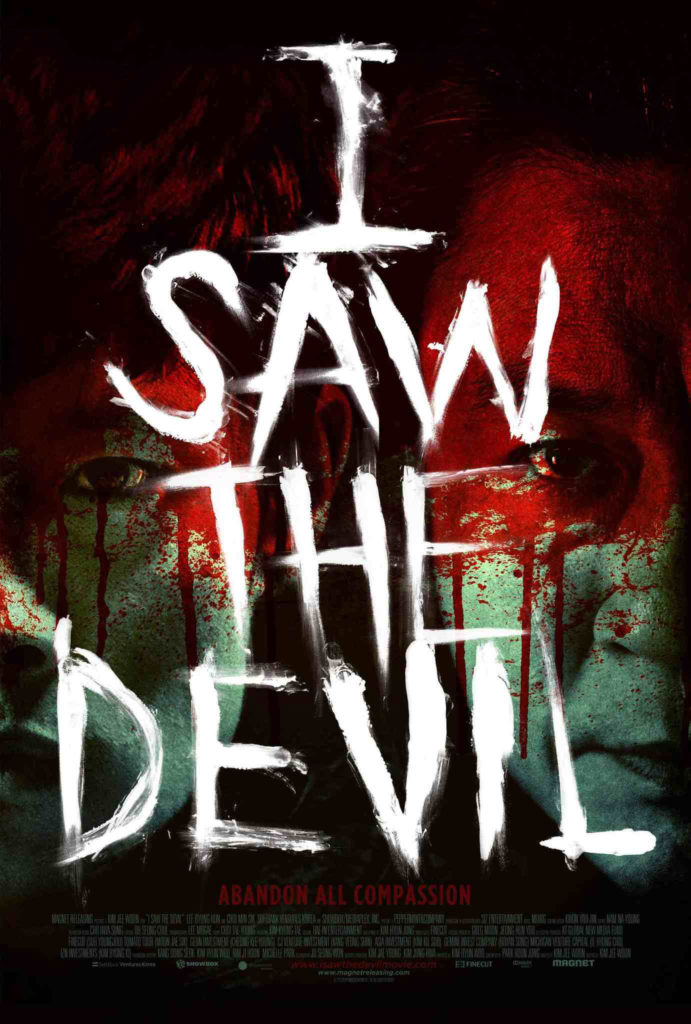Receiving much praise from both professional and amateur critics, and moviegoers alike, I Saw the Devil, the 2010 movie from Jee-woon Kim, performs very well on aggregator sites like Rotten Tomatoes and IMDb. The general consensus is that Kim is a very talented filmmaker, skilled in storytelling and photography. With I Saw the Devil, he crafted a disturbing look into a nightmare world of revenge and horror, powerfully emotional, and unrelenting in its depiction of violence. In general, when both critics and audiences are in alignment like this, there’s nothing more to say. I’m going to zag a bit, though.
It’s going to be hard for regular readers of the Horrorshow to believe this, but I think the violence in I Saw the Devil overwhelms the movie. I’ve written often that a certain horror movie could use more gore. That’s because I enjoy the fiction of fun house violence. Truly agonizing depictions of violence work well in something like Hereditary or Irréversible, where the suddenness of it complements the themes of the film, and it’s used in limited capacity, increasing its effect. But if a movie is going to be wall to wall blood and grievous bodily injury, I prefer it to be tempered by being outrageous and/or silly.
I don’t feel the scale of the violence in I Saw the Devil is complementary to the story. It’s manipulative in a mean-spirited way, and rather than, say, grounding the movie in reality, it makes it seem as if Kim is contemptible of his audience, daring them to look away, the insinuation being that unless one watches, rapt, then one is a coward.
There are no heroes in I Saw the Devil. The only likable character dies within the first few minutes, and that is Jang Joo-yun (Oh San-ha), whose car has a flat on a lonely stretch of wintry, night-shrouded road. She is attacked and murdered by Jang Kyung-chul (Choi Min-sik),  a serial killer who treats his victims like pigs in an abattoir. With this first scene, Kim gives only a glimpse of what a viewer will be enduring for this film’s 144-minute runtime.
a serial killer who treats his victims like pigs in an abattoir. With this first scene, Kim gives only a glimpse of what a viewer will be enduring for this film’s 144-minute runtime.
Joo-yun, unfortunately for Kyung-chul, is the fiancé of Korean National Intelligence Service Special Agent Kim Soo-hyun (Lee Byung-hun), and her murder sets him off on a spree of vigilantism so awful that there is no way Soo-hyun can be considered a protagonist. He gets a list of suspects from contacts in the police investigating the murder, and goes through them methodically, beating them each until he’s satisfied they are not the killers. It doesn’t take long for him to set his sights on Kyung-chi, and he proves, through means inadmissible in any court, that Kyung-chi is the killer. But, Soo-hyun is not interested in justice. He wants revenge. Rather than confronting Kyung-chul one time, Soo-hyun decides to torture and release Kyung-chi, over and over again like the world’s most sadistic sports fisherman, the plan being to make Kyung-chi suffer for a prolonged period before finally delivering the coup de grâce.
Kyung-chi is a determined and violent man, however, so he doesn’t go quietly into that good night. It would have been better for all involved if Soo-hyun had carried out his revenge in swift fashion. But, since Kyung-chi is essentially a free man, he continues murdering. Soo-hyun doesn’t seem to care that his actions have, in effect, put more people in danger. It’s just collateral damage to him. What follows is two hours of cat and mouse, with many, many innocent people getting caught up in these sick games.
Viewers will begin feeling the length of this movie well before it gets to the final act. I have to agree with the consensus that the storytelling is tight, with the exception of an interlude where yet another killer was introduced to the film. The sequence featuring this new antagonist, Tae-joo (Choi Moo-sung), constitutes almost an entire act in its own right, and could have been excised with little effect on the plot.
By the end, the film is just two psychopaths competing to see who can induce the most disgust in the audience. Kyung-chi even takes on a little bit of the antihero, which just sucks. Soo-hyun becomes so unlikable and so crazed that I wanted him to pull back, or at least suffer just as much as Kyung-chi. That’s what the violence in this film did. It made me hate the characters and it made me hate the plot. It’s tough to like a film after that. So, I didn’t.
As a commentary on the futility of revenge, I Saw the Devil rates high. As an exercise in horror filmmaking, it’s over-indulgent. If Kim thought he was pushing boundaries, he wasn’t. There’s nothing new with this level of violence in film. Where he faltered was treating it as cartoonish when it was very much not.
